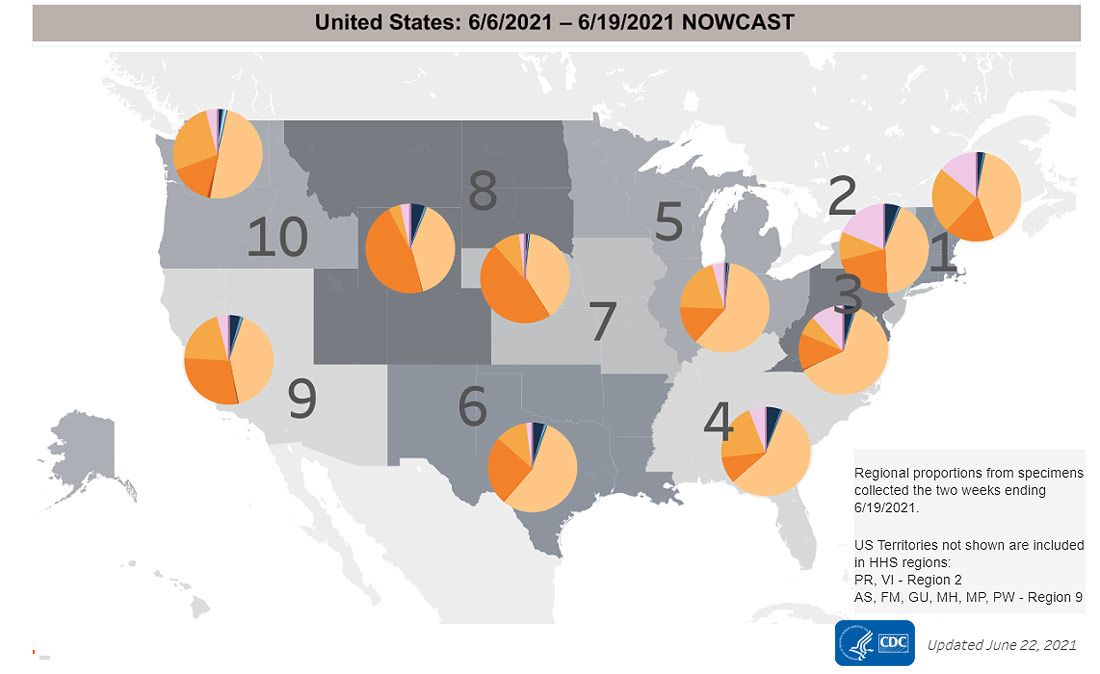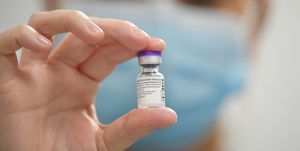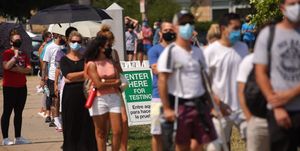- The World Health Organization (WHO) just released new guidelines for combatting the highly contagious COVID-19 Delta variant that is quickly spreading around the world.
- Experts recommend that fully vaccinated people continue to wear masks and practice other coronavirus safety measures.
- Scientists are also studying if people who received the Johnson & Johnson one-dose vaccine might need boosters of the Pfizer or the Moderna mRna-based vaccines.
Countries around the world are entering new lockdowns as the coronavirus Delta variant continues to spread. Australia, Bangladesh, Germany, and South Africa are the latest in a string of nations to put new restrictions in place to try and curb the strain, per The Washington Post.
Even as the U.S. population inches closer to halfway fully vaccinated, the World Health Organization is urging people not to throw caution to the wind. The Delta variant has already shown different mutations and a faster transmission rate than COVID-19, and experts are continually learning more about it.
The WHO has been tracking COVID-19 variants since the beginning of the pandemic, and the Delta variant has been elevated into a “variant of concern” because it’s a more contagious strain. Here’s everything you need to know about the Delta variant—and how to protect yourself and others.
What is the Delta variant?
The WHO recently said that Delta is becoming the dominant COVID-19 variant worldwide, per CNBC. While the strain was first found in India, it has now spread to 80 countries, and it targets the most vulnerable individuals (mostly in places with low vaccination rates), per The New York Times.
There isn’t enough research available yet to confirm reports that the Delta variant may cause more severe symptoms. But Delta is potentially “more lethal because it’s more efficient in the way it transmits between humans and it will eventually find those vulnerable individuals,” Dr. Mike Ryan, executive director of the WHO’s health emergencies program, said last week.
What is the Delta-plus variant?
After the Delta variant surfaced, a newer “Delta-plus” variant was also identified in India. Not much is known about Delta-plus, since researchers haven’t had much time to study it yet, but it’s believed to also be highly transmissible (like the Delta variant), per Los Angeles Times.
Dr. George Rutherford, an epidemiologist at UC San Francisco, says “it sounds like just another variant that’s no better, no worse, than the regular Delta variant, and it’s a little unclear why everybody’s pushing on it. I don’t see that this is a big, big problem right now.”
Dr. Monica Gandhi, an infectious-diseases expert at UC San Francisco, told the Los Angeles Times that “I know it keeps on seeming like there’s more and more, and so it’s certainly understandable why people are like, ‘Why doesn’t it stop?’ Once you tamp down transmission, it really will stop accumulating these mutations… That is the reason why we want to, of course, have global vaccine equity: to stop transmission.”
Is the Delta variant already in the U.S.?
Yes, the Delta variant has already arrived in America. In a White House briefing last Tuesday, Dr. Anthony Fauci from the National Institute of Health said that 20.6% of new coronavirus cases in the U.S. are due to the Delta variant, per NPR.
The CDC continues to add to its interactive map of Delta variant cases in the U.S.:

Based on the CDC map, Delta is most present in central and western states, including Colorado, Montana, Wyoming, and Nebraska–but California and Texas aren’t far behind, per Fast Company.
“The Delta variant is currently the greatest threat in the U.S. to our attempt to eliminate COVID-19,” Fauci said. He also explained that the number of cases that are caused by the Delta variant is doubling every two weeks, per NPR.
“We have the tools, so let’s use them and crush the outbreak,” he said.
https://www.instagram.com/p/CQehxpNl_J5/
A post shared by Centers for Disease Control (@cdcgov)
Who is at risk for contracting the Delta variant?
Experts say that people in places with low COVID-19 vaccination rates are among the most vulnerable populations. “There still are big portions of the country where the rates of vaccination are quite low,” said Dr. Jeremy Luban, a virologist at the University of Massachusetts Medical School, per NPR. “This Delta variant is increasing in frequency — the speed at which it’s increasing in frequency is greatest in those areas where vaccination rates are lowest.”
Justin Lessler, an epidemiologist at Johns Hopkins University, says experts are keeping an eye on the Delta variant. “For the most part, it’s a moderate resurgence,” he said, per NPR. “We’re not having massive epidemics at a national level, but we have this kind of continuation of the virus just sticking around and keeping us on our toes. And in specific places, there could be substantial epidemics still.”
What new guidelines have the WHO released about the Delta variant?
On Friday, the WHO strongly advised fully vaccinated people to continue wearing masks, social distance six feet apart, and practice other COVID-19 safety measures, per CNBC.
Dr. Mariangela Simao is the WHO assistant director-general for access to medicines and health products. During a news briefing, she said that fully vaccinated people should continue to be cautious. “People cannot feel safe just because they had the two doses,” she said. “They still need to protect themselves.”
She added that the “vaccine alone won’t stop community transmission. People need to continue to use masks consistently, be in ventilated spaced, hand hygiene…the physical distance, avoid crowding. This still continues to be extremely important, even if you’re vaccinated when you have a community transmission ongoing,” per CNBC.
Does the coronavirus vaccine protect against the Delta variant?
Yes. Dr. Rochelle Walansky, the director of the Centers for Disease Control and Prevention, says that COVID-19 vaccines do protect against the Delta variant. “We know our vaccines work against this variant,” she said, per NPR. “However this variant represents a set of mutations that could lead to future mutations that evade our vaccines. And that’s why it’s more important than ever to get vaccinated now to stop the chain of infection, the chain of mutations that could lead to a more dangerous variant.”
A new study found that the Moderna vaccine did produce neutralizing antibodies for the delta variant, plus a few others, per CNBC. However, it’s important to note that the study was small, and the data hasn’t been peer reviewed yet.
Can I still get COVID if I’m fully vaccinated?
Yes, but the chances are very small. Any case contracted after an individual has already been fully vaccinated is considered a breakthrough case. And some Delta cases have already been labeled breakthrough cases, according to The Wall Street Journal. Breakthrough cases are to be expected because the vaccines aren’t 100% foolproof against Covid, says Professor Ran Balicer, the chief innovation officer for Clalit, Israel’s largest health-management organization.
The CDC stopped tracking all breakthrough cases back in May. But they aren’t as serious as they might sound: “If you are fully vaccinated, you have a lot of protection,” L.A. County Public Health Director Barbara Ferrer told the Los Angeles Times. “And for the very small numbers of people that may end up in fact with a breakthrough vaccination case, they really did not have serious illness.”
Dr. Fauci seconded that Delta breakthrough cases tend to be less serious. “Importantly, the protection against severe disease resulting in hospitalization and death is over 90%, 93, 94%. So if you are vaccinated, you’re going to be protected,” he said in an interview with NPR.
For more information, the WHO recently posted a Q&A session about the impacts COVID-19 variants may have on vaccines’ effectiveness on its Instagram.
A post shared by World Health Organization (@who)
Will I need a vaccine booster shot?
Possibly. Some experts are beginning to consider vaccine booster shots as one defense against the Delta variant, per Nasdaq. They’re studying whether people who received Johnson & Johnson’s JNJ.N one-dose vaccine might need booster shots of the Pfizer/BioNTech PFE.N, BNTX.O or Moderna MRNA.O mRNA-based vaccines in order to protect themselves.
https://www.instagram.com/p/COSr8Bnjt-T/
A post shared by World Health Organization (@who)
A few experts have already gotten booster shots, just to be safe, even though only preliminary data exists on whether combining different vaccines is safe and effective. Dr. Peter Hotez from Baylor College of Medicine tweeted that getting a J&J dose on top of a Pfizer or Moderna dose could offer better protection, but further guidance was necessary.
Source: Read Full Article





